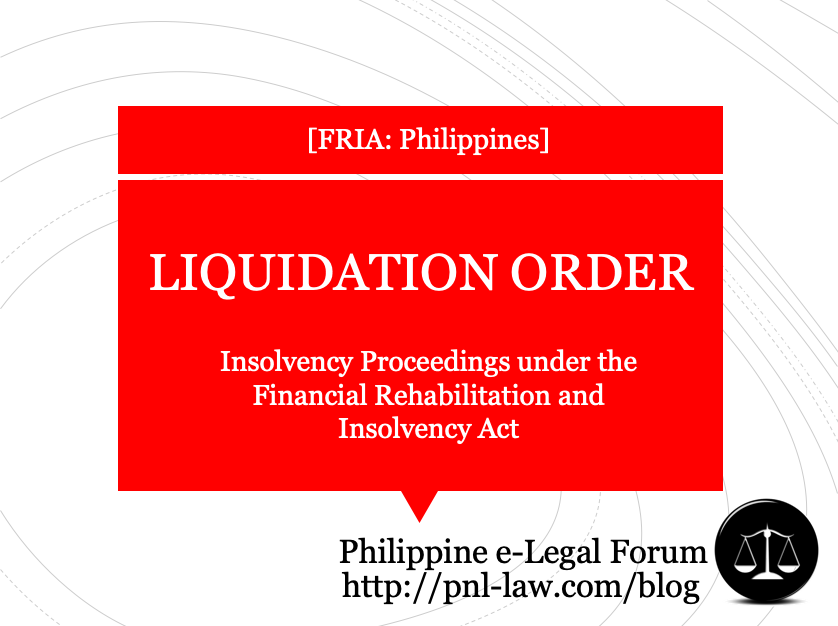Insolvency proceedings may refer to voluntary or involuntary proceedings for individual debtors (see Voluntary liquidation and Involuntary liquidation) or juridical entities (see Liquidation proceedings). The provisions on Liquidation Order are common in all these proceedings, as provided under Republic Act No. 10142, also known as the “Financial Rehabilitation and Insolvency Act (FRIA) of 2010“, and fleshed out in the FLSP Rules. For purposes of these common provisions, the term “debtor” includes individual debtors and other juridical debtors.

THE LIQUIDATION ORDER
The Liquidation Order shall:
- (a) declare the debtor insolvent;
- (b) order the liquidation of the debtor and, in the case of a juridical debtor, declare it as dissolved;
- (c) order the sheriff to take possession and control of all the property of the debtor, except those that may be exempt from execution;
- (d) order the publication of the Liquidation Order, together with the petition, or motion to convert the rehabilitation proceedings into liquidation proceedings, if any, in a newspaper of general circulation in the Philippines once a week for 2 consecutive weeks;
- (e) direct payments of any claims and conveyance of any property due the debtor to the liquidator;
- (f) prohibit payments and the transfer of any property by the debtor;
- (g) direct all creditors to file their claims with the liquidator not later than 5 days from the time the liquidator takes his oath of office, furnishing a copy thereof to the court;
- (h) authorize the payment of administrative expenses as they become due;
- (i) state that the debtor and creditors who are not petitioner/s may submit the names of other nominees to the position of liquidator; and
- (j) set the case for hearing for the election and appointment of the liquidator, which date shall not be less than 30 days nor more than 45 days from the date of the last publication.
| Other Common Provisions: * Avoidance proceedings * The Liquidator | * Determination of Claims * The Liquidation Plan * Secured creditors |
EFFECTS OF THE LIQUIDATION ORDER
Upon the issuance of the Liquidation Order:
- (a) the juridical debtor shall be deemed dissolved and its corporate or juridical existence terminated;
- (b) legal title to and control of all the assets of the debtor, except those that may be exempt from execution, shall be deemed vested in the liquidator or, pending his election or appointment, with the court;
- (c) all contracts of the debtor shall be deemed terminated and/or breached, unless the liquidator, within 90 days from the time he takes his oath of office, declares otherwise and the contract counter-party agrees;
- (d) no separate action for the collection of an unsecured claim shall be allowed. Actions already pending will be transferred to the liquidator for him to accept and settle or contest. If the liquidator contests or disputes the claim, the court shall allow, hear, and resolve such contest, except when the case is already on appeal. In such a case, the suit may proceed to judgment, and any final and executory judgment therein for a claim against the debtor shall be filed and allowed in court; and
- (e) no foreclosure proceeding shall be allowed for a period of one hundred 180 days from the date of the order.
